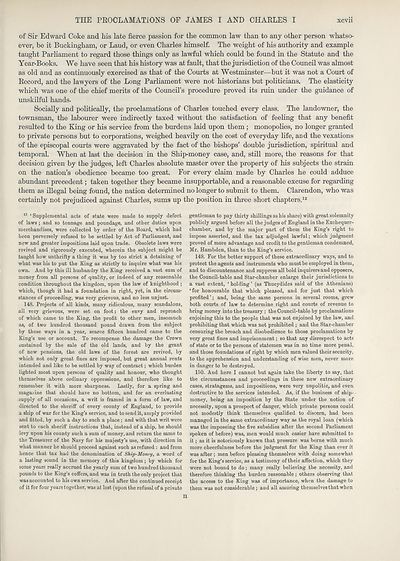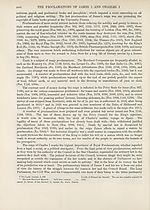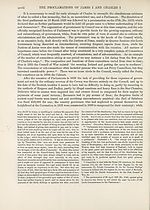Bibliography of royal proclamations of the Tudor and Stuart sovereigns and of others published under authority, 1485-1714 > England and Wales
(109) Page xcvii
Download files
Complete book:
Individual page:
Thumbnail gallery: Grid view | List view

THE PROCLAMATIONS OF JAMES I AND CHARLES I
xcvn
of Sir Edward Coke and his late fierce passion for the common law than to any other person whatso¬
ever, be it Buckingham, or Laud, or even Charles himself. The weight of his authority and example
taught Parliament to regard those things only as lawful which could be found in the Statute and the
Year-Books. We have seen that his history was at fault, that the jurisdiction of the Council was almost
as old and as continuously exercised as that of the Courts at Westminster—but it was not a Court of
Record, and the lawyers of the Long Parliament were not historians but politicians. The elasticity
which was one of the chief merits of the Council’s procedure proved its ruin under the guidance of
unskilful hands.
Socially and politically, the proclamations of Charles touched every class. The landowner, the
townsman, the labourer were indirectly taxed without the satisfaction of feeling that any benefit
resulted to the King or his service from the burdens laid upon them ; monopolies, no longer granted
to private persons but to corporations, weighed heavily on the cost of everyday life, and the vexations
of the episcopal courts were aggravated by the fact of the bishops’ double jurisdiction, spiritual and
temporal. When at last the decision in the Ship-money case, and, still more, the reasons for that
decision given by the judges, left Charles absolute master over the property of his subjects the strain
on the nation’s obedience became too great. For every claim made by Charles he could adduce
abundant precedent; taken together they became insupportable, and a reasonable excuse for regarding
them as illegal being found, the nation determined no longer to submit to them. Clarendon, who was
certainly not prejudiced against Charles, sums up the position in three short chapters.12
15 ‘ Supplemental acts of state were made to supply defect
of laws ; and so tonnage and poundage, and other duties upon
merchandises, were collected by order of the Board, which had
been perversely refused to be settled by Act of Parliament, and
new and greater impositions laid upon trade. Obsolete laws were
revived and rigorously executed, wherein the subject might be
taught how unthrifty a thing it was by too strict a detaining of
what was his to put the King as strictly to inquire what was his
own. And by this ill husbandry the King received a vast sum of
money from all persons of quality, or indeed of any reasonable
condition throughout the kingdom, upon the law of knighthood ;
which, though it had a foundation in right, yet, in the circum¬
stances of proceeding, was very grievous, and no less unjust.
148. Projects of all kinds, many ridiculous, many scandalous,
all very grievous, were set on foot; the envy and reproach
of which came to the King, the profit to other men, insomuch
as, of two hundred thousand pound drawn from the subject
by these ways in a year, scarce fifteen hundred came to the
King’s use or account. To recompense the damage the Crown
sustained by the sale of the old lands, and by the grant
of new pensions, the old laws of the forest are revived, by
which not only great fines are imposed, but great annual rents
intended and like to be settled by way of contract; which burden
lighted most upon persons of quality and honour, who thought
themselves above ordinary oppressions, and therefore like to
remember it with more sharpness. Lastly, for a spring and
magazine that should have no bottom, and for an everlasting
supply of all occasions, a writ is framed in a form of law, and
directed to the sheriff of every county of England, to provide
a ship of war for the King’s service, and to send it, amply provided
and fitted, by such a day to such a place; and with that writ were
sent to each sheriff instructions that, instead of a ship, he should
levy upon his county such a sum of money, and return the same to
the Treasurer of the Navy for his majesty’s use, with direction in
what manner he should proceed against such as refused : and from
hence that tax had the denomination of Ship-Money, a word of
a lasting sound in the memory of this kingdom ; by which for
some years really accrued the yearly sum of two hundred thousand
pounds to the King’s coffers, and was in truth the only project that
was accounted to his own service. And after the continued receipt
of it for four years together, was at last (upon the refusal of a private
gentleman to pay thirty shillings as his share) with great solemnity
publicly argued before all the judges of England in the Exchequer-
chamber, and by the major part of them the King’s right to
impose asserted, and the tax adjudged lawful; which judgment
proved of more advantage and credit to the gentleman condemned,
Mr. Hambden, than to the King’s service.
149. For the better support of these extraordinary ways, and to
protect the agents and instruments who must be employed in them,
and to discountenance and suppress all bold inquirers and opposers,
the Council-table and Star-chamber enlarge their jurisdictions to
a vast extent, ‘ holding ’ (as Thucydides said of the Athenians)
‘for honourable that which pleased, and for just that which
profited ’; and, being the same persons in several rooms, grew
both courts of law to determine right and courts of revenue to
bring money into the treasury ; the Council-table by proclamations
enjoining this to the people that was not enjoined by the law, and
prohibiting that which was not prohibited ; and the Star-chamber
censuring the breach and disobedience to those proclamations by
very great fines and imprisonment; so that any disrespect to acts
of state or to the persons of statemen was in no time more penal,
and those foundations of right by which men valued their security,
to the apprehension and understanding of wise men, never more
in danger to be destroyed.
150. And here I cannot but again take the liberty to say, that
the circumstances and proceedings in these new extraordinary
cases, stratagems, and impositions, were very unpolitic, and even
destructive to the services intended. As, if the business of ship-
money, being an imposition by the State under the notion of
necessity, upon a prospect of danger, which private persons could
not modestly think themselves qualified to discern, had been
managed in the same extraordinary way as the royal loan (which
was the imposeing the five subsidies after the second Parliament
spoken of before) was, men would much easier have submitted to
it ; as it is notoriously known that pressure was borne with much
more cheerfulness before the judgment for the King than ever it
was after ; men before pleasing themselves with doing somewhat
for the King’s service, as a testimony of their affection, which they
were not bound to do; many really believing the necessity, and
therefore thinking the burden reasonable; others observing that
the access to the King was of importance, when the damage to
them was not considerable ; and all assuring themselves that when
n
xcvn
of Sir Edward Coke and his late fierce passion for the common law than to any other person whatso¬
ever, be it Buckingham, or Laud, or even Charles himself. The weight of his authority and example
taught Parliament to regard those things only as lawful which could be found in the Statute and the
Year-Books. We have seen that his history was at fault, that the jurisdiction of the Council was almost
as old and as continuously exercised as that of the Courts at Westminster—but it was not a Court of
Record, and the lawyers of the Long Parliament were not historians but politicians. The elasticity
which was one of the chief merits of the Council’s procedure proved its ruin under the guidance of
unskilful hands.
Socially and politically, the proclamations of Charles touched every class. The landowner, the
townsman, the labourer were indirectly taxed without the satisfaction of feeling that any benefit
resulted to the King or his service from the burdens laid upon them ; monopolies, no longer granted
to private persons but to corporations, weighed heavily on the cost of everyday life, and the vexations
of the episcopal courts were aggravated by the fact of the bishops’ double jurisdiction, spiritual and
temporal. When at last the decision in the Ship-money case, and, still more, the reasons for that
decision given by the judges, left Charles absolute master over the property of his subjects the strain
on the nation’s obedience became too great. For every claim made by Charles he could adduce
abundant precedent; taken together they became insupportable, and a reasonable excuse for regarding
them as illegal being found, the nation determined no longer to submit to them. Clarendon, who was
certainly not prejudiced against Charles, sums up the position in three short chapters.12
15 ‘ Supplemental acts of state were made to supply defect
of laws ; and so tonnage and poundage, and other duties upon
merchandises, were collected by order of the Board, which had
been perversely refused to be settled by Act of Parliament, and
new and greater impositions laid upon trade. Obsolete laws were
revived and rigorously executed, wherein the subject might be
taught how unthrifty a thing it was by too strict a detaining of
what was his to put the King as strictly to inquire what was his
own. And by this ill husbandry the King received a vast sum of
money from all persons of quality, or indeed of any reasonable
condition throughout the kingdom, upon the law of knighthood ;
which, though it had a foundation in right, yet, in the circum¬
stances of proceeding, was very grievous, and no less unjust.
148. Projects of all kinds, many ridiculous, many scandalous,
all very grievous, were set on foot; the envy and reproach
of which came to the King, the profit to other men, insomuch
as, of two hundred thousand pound drawn from the subject
by these ways in a year, scarce fifteen hundred came to the
King’s use or account. To recompense the damage the Crown
sustained by the sale of the old lands, and by the grant
of new pensions, the old laws of the forest are revived, by
which not only great fines are imposed, but great annual rents
intended and like to be settled by way of contract; which burden
lighted most upon persons of quality and honour, who thought
themselves above ordinary oppressions, and therefore like to
remember it with more sharpness. Lastly, for a spring and
magazine that should have no bottom, and for an everlasting
supply of all occasions, a writ is framed in a form of law, and
directed to the sheriff of every county of England, to provide
a ship of war for the King’s service, and to send it, amply provided
and fitted, by such a day to such a place; and with that writ were
sent to each sheriff instructions that, instead of a ship, he should
levy upon his county such a sum of money, and return the same to
the Treasurer of the Navy for his majesty’s use, with direction in
what manner he should proceed against such as refused : and from
hence that tax had the denomination of Ship-Money, a word of
a lasting sound in the memory of this kingdom ; by which for
some years really accrued the yearly sum of two hundred thousand
pounds to the King’s coffers, and was in truth the only project that
was accounted to his own service. And after the continued receipt
of it for four years together, was at last (upon the refusal of a private
gentleman to pay thirty shillings as his share) with great solemnity
publicly argued before all the judges of England in the Exchequer-
chamber, and by the major part of them the King’s right to
impose asserted, and the tax adjudged lawful; which judgment
proved of more advantage and credit to the gentleman condemned,
Mr. Hambden, than to the King’s service.
149. For the better support of these extraordinary ways, and to
protect the agents and instruments who must be employed in them,
and to discountenance and suppress all bold inquirers and opposers,
the Council-table and Star-chamber enlarge their jurisdictions to
a vast extent, ‘ holding ’ (as Thucydides said of the Athenians)
‘for honourable that which pleased, and for just that which
profited ’; and, being the same persons in several rooms, grew
both courts of law to determine right and courts of revenue to
bring money into the treasury ; the Council-table by proclamations
enjoining this to the people that was not enjoined by the law, and
prohibiting that which was not prohibited ; and the Star-chamber
censuring the breach and disobedience to those proclamations by
very great fines and imprisonment; so that any disrespect to acts
of state or to the persons of statemen was in no time more penal,
and those foundations of right by which men valued their security,
to the apprehension and understanding of wise men, never more
in danger to be destroyed.
150. And here I cannot but again take the liberty to say, that
the circumstances and proceedings in these new extraordinary
cases, stratagems, and impositions, were very unpolitic, and even
destructive to the services intended. As, if the business of ship-
money, being an imposition by the State under the notion of
necessity, upon a prospect of danger, which private persons could
not modestly think themselves qualified to discern, had been
managed in the same extraordinary way as the royal loan (which
was the imposeing the five subsidies after the second Parliament
spoken of before) was, men would much easier have submitted to
it ; as it is notoriously known that pressure was borne with much
more cheerfulness before the judgment for the King than ever it
was after ; men before pleasing themselves with doing somewhat
for the King’s service, as a testimony of their affection, which they
were not bound to do; many really believing the necessity, and
therefore thinking the burden reasonable; others observing that
the access to the King was of importance, when the damage to
them was not considerable ; and all assuring themselves that when
n
Set display mode to: Large image | Transcription
Images and transcriptions on this page, including medium image downloads, may be used under the Creative Commons Attribution 4.0 International Licence unless otherwise stated. ![]()
| Permanent URL | https://digital.nls.uk/106225246 |
|---|
| Attribution and copyright: |
|
|---|
| Description | Privately printed catalogues of the special collections of the Bibliotheca Lindesiana, the family library of the Earls of Crawford and Balcarres. Reformation Tracts, English Newspapers and De Bry Collection catalogues provide the only record of the contents of these collections. Also include catalogues of Bibliotheca Lindesiana collections now held elsewhere. |
|---|

